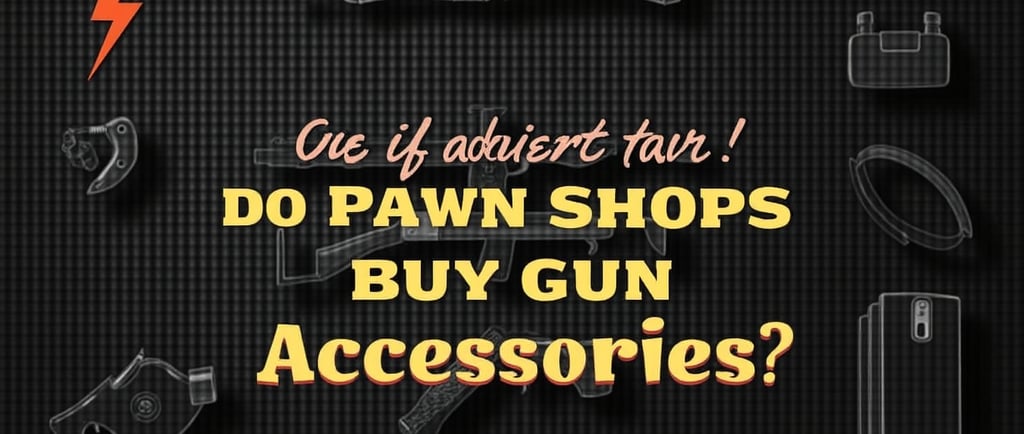Do pawn shops buy gun accessories?
Pawn shops do buy gun accessories—but only if they see value. Brand, condition, and demand shape every deal. Understand their process. Know your gear’s worth.
7/3/20256 min read


Curious whether pawn shops buy gun accessories like scopes, magazines, holsters or stocks? The direct answer is yes—many pawn shops will buy or pawn shooting accessories, provided they hold a Federal Firearms License (FFL) and comply with relevant background checks. These shops often carry a varied inventory—red dots, rifle scopes, cleaning kits, and magazines—so accessories can be in demand jspawnguns.com+15packratspawnshop.com+15reddit.com+15reddit.com+2cashmyguns.com+22jspawnandgun.com+2guns.com+8findlaw.com+8bravostoresystems.com+8bravostoresystems.com+6northphoenixguns.com+6cashmyguns.com+6fastbound.com+1pawnamerica.com+1.
Still, not every pawn shop is the same. Offers vary significantly based on condition, brand, and regional resale value. To avoid lowballing, come prepared with documentation, know your accessories’ market value, and consider alternative selling channels like private sales or online gun‑accessory dealers.
What gun accessories do pawn shops buy?
Many pawn shops will buy gun accessories, but they focus on what they can resell fast. High-demand items move. Low-end gear collects dust. If you’re walking in with generic sling mounts or off-brand optics, expect a pass or a lowball offer.
What do they actually want? Scopes—especially from brands like Trijicon, Vortex, or Leupold. Red dot sights are also in demand, as long as they’re functional and not beat to hell. Holsters (Kydex, leather, modular systems) can sell, especially if they fit common pistols. Magazines—factory over aftermarket—are quick flips. Vertical grips, tactical stocks, and even weapon lights get interest, if they’re from known brands.
From personal experience, gear that’s field-tested and still clean has better chances. I’ve seen pawn shop clerks pull apart an optic just to check the glass for scratches. They care about what works, not what looks good.
Don’t expect them to take ammo, suppressors, or anything that trips legal wires. If it requires paperwork or attracts ATF eyes, they’re likely to avoid it.
Pawn shops buy what they can move. Know your gear, keep it clean, and stick to brand-name accessories with clear resale value.
Legal rules: FFL license & background checks
Most pawn shops that deal with firearms and accessories must have an FFL—Federal Firearms License. It’s not optional. If they’re taking in serialized parts, frames, or certain optics, that license keeps them legal.
But here’s where it gets tricky.
Accessories without serial numbers—like holsters, grips, or magazines—don’t usually trigger paperwork. Still, some pawn shops apply the same level of caution. They’ll avoid anything that even smells like a gray area. Especially in states with tighter laws.
Background checks are typically required for firearms—not for accessories. But again, that doesn’t mean shops don’t play it safe. A few won’t touch high-capacity magazines, even if they’re legal in your area. They’ve been burned before.
Shops with active FFLs log everything. They’ll check the origin of parts. If something’s stolen, it flags quickly. I’ve known guys who walked in with gear they thought was clean—turns out it wasn’t. That’s a quick way to lose your accessory and get a visit.
Important rule: If it attaches to a gun, a pawn shop might treat it like a gun. Especially optics, tactical lights, or serialized uppers. Even if it’s technically “just an accessory,” expect questions.
Best move? Call ahead. Ask if they buy what you’ve got. Then show up with ID, proof of purchase, and no surprises.
Stay squared away. Sloppy gear and bad paperwork lead to rejections.
How pawn shops appraise shooting accessories?
Pawn shops assess value fast. No long deliberation. They look for three things—brand, condition, and resale speed.
Brand matters. Name recognition moves inventory. A worn Aimpoint will fetch more than a mint no-name red dot. Same for SureFire lights, Magpul stocks, or Safariland holsters.
Condition comes next. Dust, scratches, or missing parts knock the price down. If the gear looks like it’s been dragged through gravel, expect a hard pass—or a low offer. On the other hand, clean gear with signs of regular care? That holds value.
Third factor—can they resell it fast? Pawn shops don’t want shelf-sitters. A Glock 19 holster? Sure. A left-handed rig for an obscure revolver? No chance.
They also consider completeness. Have the box? Manuals? Mounting tools? That boosts confidence. It also shows you didn’t treat your gear like junk.
Some shops test optics or lights before buying. Batteries dead? That hurts your case. Functional gear speaks for itself.
Last thing—they check demand locally. What sells in Arizona might not move in upstate New York. What you paid doesn’t matter. What they think they can get is all that counts.
If you want a better deal, prep like you’re selling to someone who knows what they’re doing. Because they do.
Selling vs pawning gun accessories
You’ve got two choices: sell outright or pawn for a loan. Each has trade-offs.
Selling is clean. One transaction. One payment. No strings.
Pawning means leaving your gear as collateral for a loan. You get less up front but keep the option to reclaim it. Pay the loan plus interest, and you get your gear back.
But here’s the catch—if you don’t repay on time, it becomes theirs. No refunds. No negotiations.
From experience, pawn shops usually offer 40–60% of resale value for accessories. For loans, expect even less. They build in risk.
Selling makes sense if you don’t plan to use the item again. Pawning works if you’re short on cash and want the gear back later.
Just don’t expect top dollar either way. Pawn shops make money on resale, not generosity.
If you’re emotionally attached to the item, don’t pawn it. You might not get it back.
Get the best price for your gun accessories
Want better offers? Show up prepared.
Clean your gear. No gunk, no grime. Wipe optics. Empty magazines. Make it look like something they’d want on a shelf.
Bring original boxes, manuals, and receipts if you have them. Packaging shows legitimacy. Documentation builds trust.
Know the market. Look up current resale prices on eBay, GunBroker, or used gear forums. Walk in with a realistic number in mind.
Don’t oversell. Be direct. Give them a reason to offer more. Mention if the gear has been field-tested or used in professional environments. That adds credibility—not flash.
Avoid bringing in a bundle of mixed gear. Focus on one or two high-value items per trip.
If a shop lowballs you, thank them and walk out. Try another. Most cities have multiple options.
Finally, don’t wait until you're desperate. People get the worst deals when they need cash fast.
You don’t need to game the system—just respect it.
Other places to sell gun accessories
Pawn shops are convenient. But they’re not your only choice.
Online platforms like GunBroker, Armslist, or Reddit’s r/GunAccessoriesForSale offer access to direct buyers. Takes more time. Usually more money.
Consignment shops or local FFL dealers will sell gear for a cut. Less effort on your part, but slower turnaround.
Private sales work too—if legal in your state. Always check local laws. Document the transaction.
Some online sites specialize in used tactical gear. Sites like Cash for Arms or even Facebook gear groups (where allowed) can help move niche items.
You could also trade. Swapping gear on trusted forums or among contacts avoids fees and builds network value.
Last option—keep it. Some accessories aren’t worth the hassle to sell. Save them for your next build or loan to a buddy who trains.
Choose based on time, effort, and value. Don’t assume the first offer is the best.
FAQ (Frequently ASked Questions)
Do all pawn shops buy gun accessories?
No. Many do. Some don’t. Call ahead. Ask directly.
How much do they pay?
Usually 40–60% of what they believe they can resell it for. Condition and brand drive price.
Can I pawn a red dot or holster?
Yes, if the shop handles accessories. They treat optics, lights, and branded holsters like other pawnable goods.
Do I need paperwork?
Not always. But it helps. Receipts, manuals, or serial numbers (if present) speed things up and build trust.
Is it legal to sell gun accessories?
In most states, yes—if it’s not a regulated item. Avoid NFA items (suppressors, SBR parts). Those require paperwork and are often rejected outright.
Can I pawn just the accessory, not the gun?
Yes. Accessories without serial numbers can be pawned or sold separately, as long as they’re not restricted.
What happens if I don’t repay my pawn loan?
The shop keeps the item and sells it. No refunds. No second chances.
What accessories are easiest to sell?
Scopes, lights, branded stocks, factory magazines. Think gear with broad use and good condition.
Do pawn shops test the gear?
Some do. Lights, optics, and lasers often get powered on and checked before they buy.
Conclusion
Pawn shops do buy gun accessories—but only if they see value. Brand, condition, and demand shape every deal. Understand their process. Know your gear’s worth.
If you want a quick transaction, show up ready. Clean, documented, and realistic.
If you want top dollar, look elsewhere—online or private sales may be better. But if you value speed over price, pawn shops still have a place.
Just don’t expect charity. They run a business. You bring gear. They make offers.
That’s the trade. Keep it sharp.
